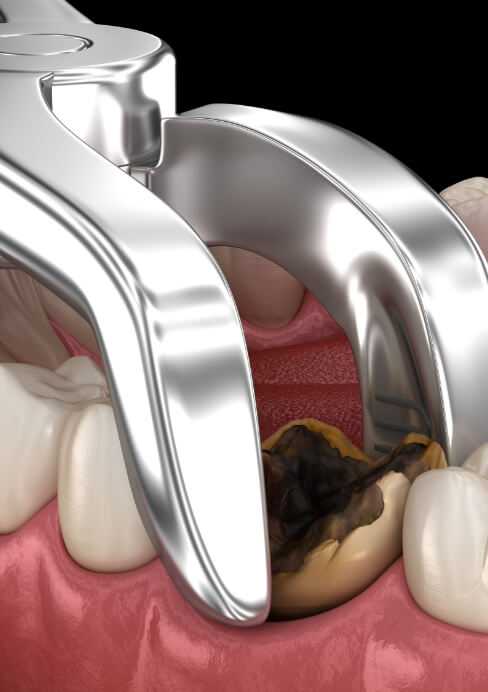Tooth Extractions – Pasadena, TX
Removing Teeth to Protect Your Oral Health
No one wants to lose their teeth, and tooth extraction is never your dentist’s first choice. However, sometimes, tooth extractions from our Pasadena, TX dentist are necessary to restore and maintain the health of your smile. Ultimately, if a tooth is damaged to the point where it cannot be repaired, it can cause problems in surrounding areas. Fortunately, at Pasadena Family Dentistry, we offer tooth extractions to eliminate your troublesome tooth. To find out if this is the right option for you, give us a call!
Why Choose Pasadena Family Dentistry for Tooth Extractions?
- Partnered with Local Dental Implant Experts
- Long-Lasting, Lifelike Dental Restorations
- Oral Conscious and Nitrous Oxide Sedation Offered
Reasons Why Tooth Extractions Are Necessary

We always do everything in our power to help patients keep their natural teeth, but sometimes it simply isn’t a viable option. Here are some reasons why tooth extraction may be necessary to restore your overall dental health and function:
- There is severe damage or decay to the tooth that is irreparable.
- To ensure the long-term success of a restoration, like a denture.
- To allow for a patient to undergo orthodontic treatment.
- If a tooth is impacted and unable to erupt properly.
- When a primary tooth won’t fall out on its own.
By extracting problematic teeth, future infections and other oral health issues are much less likely to occur.
The Process of Removing a Tooth

Teeth are either removed by pulling or surgical extraction. Teeth can only be “pulled” when they have fully emerged from the gum line. In this case, we will start by numbing the area around your teeth with a local anesthetic and using a clasping tool to shift around the tooth until it breaks away from the gum line. If pulling a tooth isn’t possible, the tooth will need to be surgically extracted. For this procedure, a small incision is made to the gum tissue to allow us to reach enough of your tooth to fully remove it.
To determine which extraction method is necessary for you, come see us for a consultation where we can evaluate your smile. When we discuss your extraction, we can also talk about tooth replacement options to prevent future oral health issues as a result of missing teeth.
Tooth Extraction Aftercare

Before you leave our dental office, we will provide you with specific aftercare instructions to help you stay comfortable and avoid complications. Every case is different, but here are some steps that we typically recommend for a quick recovery:
- Rinse with saltwater 24 hours after your procedure.
- Avoid using tobacco products until your mouth has healed.
- Keep your head elevated while you sleep.
- Get plenty of rest to promote healing.
- Take recommended over-the-counter and prescribed medication as directed.
- Apply a cold compress to reduce swelling and discomfort.
- Stay away from hard, crunchy, and sticky foods.
Understanding the Cost of Tooth Extractions

Tooth extractions tend to make patients a little bit nervous. We do everything that we can to ensure that your treatment is completely comfortable through every step of the process, including the financial component.
We’ll give you a full estimate for what your dental care is going to cost when we meet you in person, but before then, here’s what you should know about the factors that can influence the price of your tooth’s removal.
Factors That Can Affect Tooth Extraction Cost

It can be a little bit difficult to talk to you about what your tooth extraction is going to cost without knowing the particulars of your treatment. This is because there are several variables that can influence the price of your tooth extraction in one way or another, including:
- The type of tooth that is being removed (molar, bicuspid, or incisor)
- How many teeth need to be removed
- What variety of tooth replacement option you’re using after the extraction is complete
- Whether the tooth is impacted or not
In the case of more complex procedures, an external specialist may need to be brought in to handle the surgery. In such scenarios, this specialist will usually have their own rate for dental care.
Does Dental Insurance Cover Tooth Extractions?

Tooth extractions are generally only done for medical reasons, which means that most dental insurance companies are likely to pay for at least a portion of the treatment. This varies from plan to plan, but many insurance companies will cover around 50% of the total cost of a tooth extraction after a deductible has been met. We’ll help you consult with your dental plan to ensure that you’re getting the most out of your benefits.
Other Options for Making Tooth Extractions Affordable

We also know that not everyone has dental insurance, so we offer alternatives that can potentially make our services more affordable. For one, we have an in-house membership plan that provides patients substantial discounts to the services that we provide, in addition to complementary preventive care.
We also frequently work with CareCredit and Lending Club, two financing firms that can allow you to split up the cost of your services across several months. Give us a call and we’ll review all of the financial options available to you.
Tooth Extractions FAQs
Does Getting a Tooth Extracted Hurt?
Many patients experience anxiety when it comes to dental work, but this can be especially challenging for those with an upcoming extraction. It’s natural to wonder whether the process of removing a tooth will be painful. Rest assured, our dedicated team will do everything we can to ensure that you’re kept comfortable during the process itself. We’ll numb the area first with a topical anesthetic and can also administer sedatives if necessary.
As the meds wear off, you can probably expect to feel some mild to moderate aches and inflammation. Over the next two to three days, you should follow any post-op instructions that we’ve provided to avoid developing complications, like dry socket. If you have persistent pain that doesn’t subside after this time, please let us know so we can ensure you’re healing as intended.
How Should I Prepare for My Tooth Extraction?
It’s just as important to be properly prepared for your procedure as it is to care for yourself afterward. Sometime before your appointment, be sure that you have an open conversation with our team about any questions or concerns that you have, like what to bring, whether you should eat, etc. If you’re receiving oral conscious sedation, you’ll have to pick up your prescription so that you can take it before you arrive. That way, it’ll kick in by the time we begin working on your extraction. You’ll also want to arrange to have someone drive you home because you may still be under the influence of sedatives once your tooth is removed.
What Can I Do to Speed Up the Healing Time?
Although you may feel impatient to get back to life as usual after your extraction, it’s important to follow any orders we’ve provided to ensure that you heal as quickly and efficiently as possible. Following them in detail is the best way to ensure a swift recovery.
Once your tooth is removed, your mouth forms a blood clot over the site to shield the sensitive nerves and bone tissue that are left exposed. If this is damaged or dislodged, you could develop a painful condition called dry socket. To prevent it, get plenty of rest and avoid any strenuous activity that elevates your blood pressure or heart rate. You should also steer clear of overly hard, crunchy, spicy, hot, or acidic foods that can irritate your already sensitive gums.
You can hold an icepack to your cheek for a well-earned reprieve, and it’s usually also safe to take ibuprofen or Tylenol to address ongoing discomfort.
What Are My Options for Replacing a Missing Tooth?
It’s important to refurbish your smile as soon as possible after your extraction because once it’s gone, there’s no root there to stimulate new bone growth in your jaw so it begins to deteriorate. Different replacement methods offer various advantages that can boost your appearance as well as your dental health.
The type of replacement we recommend will depend on your unique circumstances. If you’ve lost all your natural teeth, we’ll probably suggest a full set of dentures or implant dentures. Dental bridges can be used to close the gap if you have several teeth that went missing consecutively. If you’ve only lost one or two teeth, then dental implants might be the best option. These are the only restorations that are inserted directly into your jawbone to prevent it from thinning over time.
